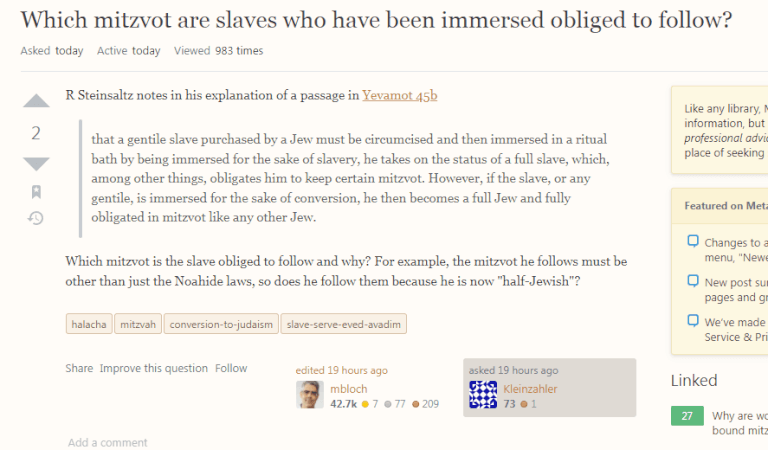A rare title that isn’t clickbait. You can find the thread here.

I had to screencap this, and yet I feel for some odd reason that this will never be taken down. Transcript of the post above.
R Steinsaltz notes in his explanation of a passage in Yevamot 45b
that a gentile slave purchased by a Jew must be circumcised and then immersed in a ritual bath by being immersed for the sake of slavery, he takes on the status of a full slave, which, among other things, obligates him to keep certain mitzvot. However, if the slave, or any gentile, is immersed for the sake of conversion, he then becomes a full Jew and fully obligated in mitzvot like any other Jew.
Which mitzvot is the slave obliged to follow and why? For example, the mitzvot he follows must be other than just the Noahide laws, so does he follow them because he is now “half-Jewish”?
Here’s the top response.
The general rule is, as cited in the Gemara (Chagiga 4a) that the obligations of a slave are equivalent to those of a women.
כׇּל מִצְוָה שֶׁהָאִשָּׁה חַיֶּיבֶת בָּהּ עֶבֶד חַיָּיב בָּהּ כׇּל מִצְוָה שֶׁאֵין הָאִשָּׁה חַיֶּיבֶת בֵּהּ אֵין הָעֶבֶד חַיָּיב בָּהּ דְּגָמַר ״לָהּ״ ״לָהּ״ מֵאִשָּׁה
As such, a slave would be exempt from any time bound mitzvos.
However, there are some exceptions to this rule:
- The obligation to procreate (פרו ורבו). Although a woman is exempt from the obligation of פרו ורבו (according to most opinions; see Yevamos 65b), some Rishonim posit that a slave is obligated (see Tosfos Chagiga 2b based on Yerushalmi Moed Katan (1:1).
- Circumcision (ברית מילה): Women are not obligated in circumcision. However, some opinions obligate a male slave in circumcision. (See R’ Akiva Eiger to YD 267, and Sha’ar Hamelech on Rambam Milah 1)
- The Prohibition of Lo Sakifu (הקפת הראש וזקן): Women are not prohibited from using a razor in certain parts of the body that men are prohibited from. According to the Rambam (see R’ Akiva Eiger ad loc for discussion), a male slave is prohibited.
- Reading of Megillas Esther (קריאת המגילה): Although women are obligated (אף הם היו באותו הנס), the Beis Yosef (OC 689) derives from the wording of Rambam (Megila 1:1, see Lechem Mishnah) that slaves are not obligated. The same is true of any time-bound mitzvah which women are obligated only because of אף הם היו באותן הנס, such as Chanukah or the Four Cups.
All of the responses are like the above. None of them are “uhm, why are we openly talking about rules for our slaves?”

It’s nice to see SOMEONE pushing back against CaNCel CulTUrE.















